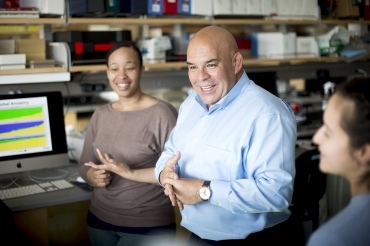Researchers to Study Drivers of Asthma in Puerto Rico
Submitted on 20 November 2018 - 6:22pm
This article is reproduced by CienciaPR with permission from the original source.
CienciaPR Contribution:
Original Source:
By:

Researchers at UC San Francisco, National Jewish Health and Centro de Neumología Pediátrica in Puerto Rico have been awarded nearly $10 million as part of a 5-year grant from the U.S. National Heart Lung and Blood Institute, part of the National Institutes of Health (NIH), to address the root causes of asthma by studying 4,000 children in Puerto Rico, where asthma prevalence and deaths are among the highest in the world. The team plans to follow the children from birth through early childhood to study how genes and viral infections affect respiratory disease.
Esteban Burchard, MD, MPH, co-principal investigator of the PRIMERO study, speaks with researchers. Credit: Noah Berger.
The new study, named the Puerto Rican Infant Metagenomic and Epidemiologic study of Respiratory Outcomes (PRIMERO), will be one of the largest U.S. birth cohort studies ever conducted in a minority population. A birth cohort is a special type of study in which newborn infants are enrolled and followed through childhood and potentially beyond to monitor exposures in early life and the onset of illnesses. Because the rate of asthma is so high in Puerto Rico, it is expected that many children will develop asthma, providing useful information to researchers to understand the causes.
“Creating a birth cohort is an extremely rare opportunity and uniquely positions us to answer fundamental questions about the early-life origins of asthma,” said co-principal investigator Esteban G. Burchard, MD, MPH, of UCSF.
“As a clinician, predicting development of asthma has been a challenge,” said José Rodríguez-Santana, MD, FAAP, FCCP, of Centro de Neumología Pediátrica in San Juan, Puerto Rico, also a co-principal investigator. “PRIMERO will help us discover why one infant can get very sick with a viral infection and develop asthma while another baby with the same viral infection has only minimal symptoms and does not develop asthma.”
Burchard and Rodríguez-Santana have collaborated for 20 years studying the genetics of asthma in Latin Americans. The new grant brings in researcher Max Seibold, PhD, of National Jewish Health, who has developed novel genetic techniques and strategies to easily obtain and analyze genetic samples from children’s airways.
“Our prospective design and the genetic techniques we have pioneered will allow us to identify biological drivers of disease and biomarkers that may predict outcomes well before they are traditionally diagnosed,” said Seibold. “These discoveries can inform development of therapeutics for early intervention and prevention of disease.”
The current grant provides funds to recruit 4,000 pregnant Puerto Rican women and 4,000 of their newborn infants over the next two years and track these infants’ respiratory health for five years.
"This will make PRIMERO the first study to investigate how the airway develops in healthy and diseased states, from birth to childhood,” said Sam Oh, PhD, MPH, director of epidemiology in the UCSF Asthma Collaboratory, who is leading oversight of the PRIMERO study design and logistics. “We hope that it will lead to new insights about how to reduce the asthma endemic to Puerto Rico and that this will be the start of a long term relationship with families to collect valuable data on the natural history of childhood asthma."







